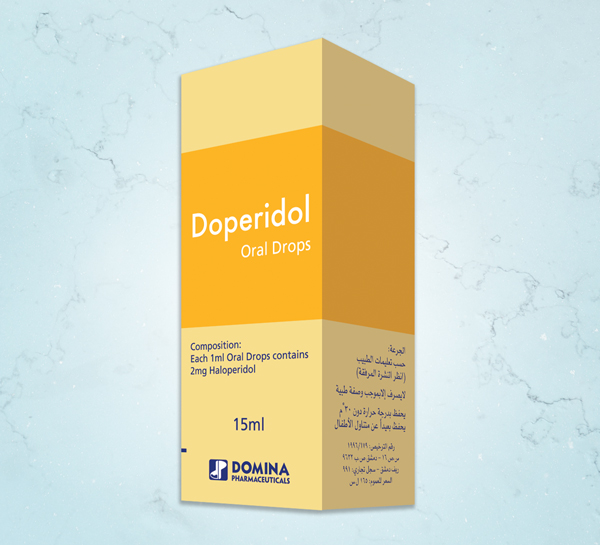
COMPOSITION:
Each 1ml oral drops contains 2mg haloperidol.
INDICATIONS:
Doperidol is a neuroleptic butyrophenone derivative, with a wide range of action. It is indicated in the following cases:
• Schizophrenia.
• Mental or behavioral disorders: aggression, hyperactivity in the mentally retarded and patients with organic brain damage.
• Restless and agitation in the elderly.
DOSAGE:
Dosage for all indications should be determined individually according to the age, severity of symptoms, and previous response to other neuroleptics. Normal starting dose should be half of the normal dose, followed by gradual titration to achieve optimal response.
(Each 30 drops of Doperidol Oral Drops contains 2 mg haloperidol)
Adults:
• Initial dose: 0.5–5mg daily divided into 2–3 doses.
• Moderate symptomatology: 1.5–3mg daily divided into 2–3 doses.
• Severe symptomatology (resistant patients): 3–5mg daily divided into 2–3 doses. Adolescents, in certain cases, may require up to 30mg, or as instructed by physician.
• Maintenance dose: Once satisfactory control of symptoms has been achieved, dosage should be gradually reduced to the lowest effective maintenance dose, often as low as 5–10mg daily. Too rapid dosage reduction should be avoided.
Elderly:
• Initial dose: 1.5–3mg divided into 2–3 doses.
• Maintenance dose: 1.5–30mg daily.
Children:
• Maintenance dose: 0.025–0.050 mg/kg daily, divided into two doses, half in the morning and the other half in the evening. Dosage should not be more than 10mg daily.
SIDE EFFECTS:
Doperidol may cause dystonic reaction, dizziness, headache, rarely oedema, skin rash, jaundice, impairment of sexual function, haematological disorders, and extrapyramidal dysfunction.
DRUG INTERACTIONS:
Doperidol increases the central nervous system depression produced by other CNS depressant drugs including alcohol, hypnotics, sedatives or opioid analgesics. An enhanced CNS effect, when combined with methyl dopa has been reported. Neurotoxic reactions and hyperthermia during combined treatment with lithium have been reported. Doperidol does not dissolve quickly with tea and coffee, thus decreasing drug absorption. Carbamazepine reduces the plasma concentrations of Doperidol.
CONTRAINDICATIONS:
Coma, bone marrow suppression or phaeochromocytoma.
PRECAUTIONS:
Caution should be taken in patients with the following cases: liver disease, renal failure, Parkinson disease, arteriosclerosis, cardiac symptoms and functional brain impairment, with hyperthyroidism and patients receiving lithium. Doperidol should be used with extreme care in children.
USE IN PREGNANCY AND LACTATION:
The product should not be used during pregnancy and lactation.